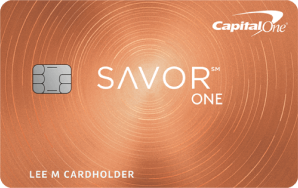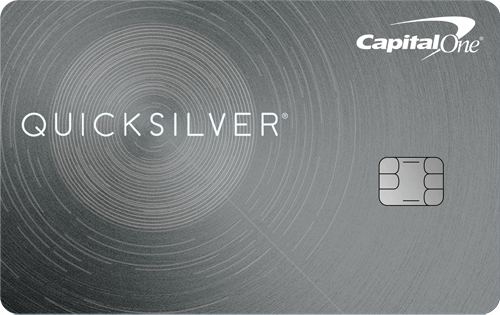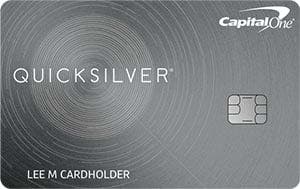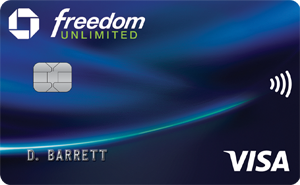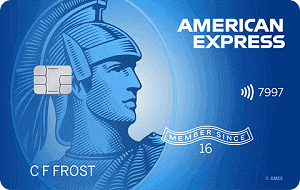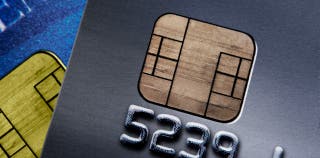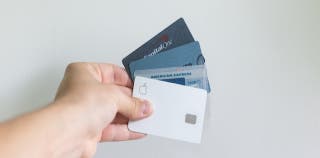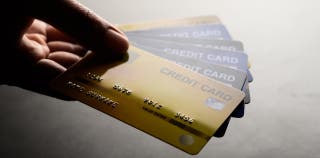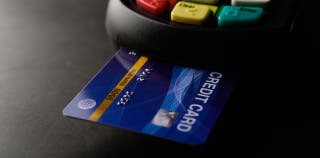- The best student credit cards are theCapital One SavorOne Student Cash Rewards Credit Card and the Capital One Quicksilver Student Cash Rewards Credit Card, among others.
- Student credit cards are a great first step toward building a solid credit history if you are just starting out.
- Using CardMatch may be able to help match you with the perfect student credit card and it won’t impact your credit score!
- Student-specific credit cards only accept enrolled students and typically allow you to apply with limited or no credit history.
- Secured credit cards are a safe option for students as they allow you to set a spending limit using an initial cash deposit. These are also great credit cards for students with no credit history, as well as for students who may not have a source of income.
- When comparing student credit cards, look for low annual percentage rates, and check that cards report to the credit bureaus to ensure you build a credit history. Cash reward points and cash back should be considered as extra or bonus criteria.
On This Page
- Key takeaways
- Our top picks for student credit cards
- What is a student credit card?
- Why get a student credit card?
- How to choose a student card
- Making the most of your student credit card
- Applying for a student credit card
- What to do with your student card after graduation
- How we selected our top cards for students
- Related resources
- Best credit cards for students FAQ
- Recommended articles
On This Page
- Key takeaways
- Our top picks for student credit cards
- What is a student credit card?
- Why get a student credit card?
- How to choose a student card
- Making the most of your student credit card
- Applying for a student credit card
- What to do with your student card after graduation
- How we selected our top cards for students
- Related resources
- Best credit cards for students FAQ
- Recommended articles
Best Credit Cards for College Students in July 2024
A student credit card is an invaluable first step towards achieving a solid credit history as you pay for textbooks or emergency expenses.
Worrying about your credit might be the last thing on your mind while studying late at night, but you’ll be happy you established it once you graduate, especially when you are applying for important milestones like being pre-approved to finance a car, buy a house, or excellent credit card deals.
Try to consider factors like annual percentage rates, cash rewards, and cash back, among other things. Credit card issuers can offer attractive incentives for signing up with them, including sign-up bonuses.
While you may not currently have much credit history, building it now can improve your odds for approval of larger ticket items in the future.
Here’s our list of the best credit cards for college students in 2024.
Our top picks for the best student credit cards
- Capital One SavorOne Student Cash Rewards Credit Card: Best Overall for Students
- Capital One Quicksilver Student Cash Rewards Credit Card: Best for Flat-rate Rewards
- Discover it® Student Cash Back: Best for Student Cash Back
- Discover it® Student Chrome: Best for Building Good Credit Habits
- Capital One Quicksilver Secured Cash Rewards Credit Card: Best for Students With No Credit
- Chase Freedom Unlimited®: Best for Students with Established Credit
- Blue Cash Everyday® Card from American Express: Best for Students with Established Credit
Our top picks for student credit cards
Best Overall for Students
Capital One SavorOne Student Cash Rewards Credit Card
Earn unlimited 3% cash back on dining, entertainment, popular streaming services and at grocery stores (excluding superstores like Walmart® and Target®), plus 1% back on all other purchases. Earn 8% cash back on Capital One Entertainment purchases. Earn 5% back on hotels and rental cars booked through Capital One Travel. Earn 10% cash back on purchases made through Uber & Uber Eats, plus complimentary Uber One membership statement credits through 11/14/2024.
Card Details
More Card Info
- Have peace of mind with $0 Fraud Liability meaning you won’t be responsible for unauthorized charges
- No foreign transaction fees or hidden fees
- Enjoy up to $500 a year when referring friends and family and they’re approved for a Capital One credit card
- Build your credit by using your card responsibly
- If you’re at a 4-year university, community college or other higher education institution, this card could be an option for you
Pros
- Good cash back rewards & welcome bonus
- No annual fee
- No foreign transaction fees
Cons
- Highest cash back requires booking through Capital One
- Possible high APR depending on credit worthiness
It’s difficult to do better than this card as a student, with high reward rates in very useful categories, no annual fee, and the ability to qualify with fair credit.
Best for Flat-rate Rewards
Capital One Quicksilver Student Cash Rewards Credit Card
Earn unlimited 1.5% cash back on all purchases and 5% back on hotels and rental cars booked through the Capital One Travel platform.
Card Details
More Card Info
- Relax with $0 Fraud Liability meaning you won’t be responsible for unauthorized charges
- No foreign transaction fees or hidden fees
- Use the Capital One Mobile app to lock your card if it’s misplaced, lost or stolen
- Enjoy up to $500 a year when referring friends and family and they’re approved for a Capital One credit card
- Build up your credit by responsibly using your card
- If you’re at a 4-year university, community college or other higher education institution, this card could be an option for you
Pros
- No annual fee / no foreign transaction fees
- No penalty APR
- Unlimited 1.5% cash back on all purchases
Cons
- High APR depending on creditworthiness
- Limited cash back bonus categories
- No intro APR offer for purchases
For students with few options, the flat-rate, no-fuss rewards of this card could make for an appealing first card.
Best for Student Cash Back
Discover it® Student Cash Back

Earn 1% cash back on all purchases and 5% cash back on everyday purchases at different places each quarter, up to the quarterly maximum when you activate.
Card Details
More Card Info
- Redeem your rewards for cash at any time.
- No credit score required to apply.
- Discover could help you reduce exposure of your personal information online by helping you remove it from select people-search sites that could sell your data. It’s free, activate with the mobile app.
- 0% intro APR on purchases for 6 months, then the standard variable purchase APR of 18.24% - 27.24% applies.
- Terms and conditions apply.
Pros
- High rewards
- Cash back matching for the first year
- Zero fees annually
Cons
- Activate bonus categories each quarter
- Limited international acceptance
- Rewards on all other purchases can be low
Best for Building Good Credit Habits
Discover it® Student Chrome
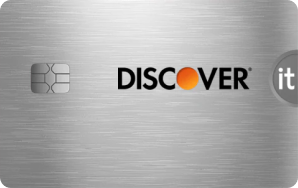
Earn 2% cashback rewards on dining and gas purchases on up to $1,000 per quarter and 1% on all other purchases.
Card Details
More Card Info
- Redeem your rewards for cash at any time.
- No credit score required to apply.
- Discover could help you reduce exposure of your personal information online by helping you remove it from select people-search sites that could sell your data. It’s free, activate with the mobile app.
- 0% intro APR on purchases for 6 months, then the standard variable purchase APR of 18.24% - 27.24% applies.
- Terms and conditions apply.
Pros
- Students can build credit while earning rewards
- Automatic cashback match at the end of the first year
- Introductory APR offer
Cons
- Rewards are less-than-stellar in comparison with other student cards
- Rewards are limited to $1,000 per quarter
- High balance transfer fee
Best for Students With No Credit
Capital One Quicksilver Secured Cash Rewards Credit Card
Earn 1.5% cash back on all purchases and 5% back on hotels and rental cars booked through the Capital One Travel platform.
Card Details
More Card Info
- Give a refundable $200 security deposit to receive a $200 initial credit line
- Use this card responsibly to help build credit
- With $0 Fraud Liability, you won’t be responsible for any unauthorized charges
- Opportunity to earn back your security deposit as a statement credit when you use your card responsibly, such as making payments on time
- Automatically considered for a higher credit line in as little as 6 months with no additional deposit required
- Use CreditWise from Capital One to monitor your credit score. It’s free for everyone
- Receive up to 6 months of complimentary Uber One membership statement credits until 11/14/2024
Pros
- Can qualify with limited credit
- No annual fee
- Unlimited 1.5% cash back on all purchases
Cons
- High APR
- Limited cash back bonus categories
- Requires a security deposit
Especially for a secured card, this card offers a decent cash-back rate, so you can earn rewards while building your credit.
Best for Students with Established Credit
Chase Freedom Unlimited®
Enjoy 6.5% cash back on travel purchased through Chase Travel℠, 4.5% cash back on drugstore purchases and dining at restaurants, including takeout and eligible delivery services, and 3% on all other purchases (on up to $20,000 spent in the first year). After your first year or $20,000 spent, enjoy 5% cash back on travel purchased through Chase Travel℠, 3% cash back on drugstore purchases and dining at restaurants, including takeout and eligible delivery service, and 1.5% cash back on all other purchases.
Best for Students with Established Credit
Blue Cash Everyday® Card from American Express
Earn 3% cash back on up to $6,000/year spent at U.S. supermarkets (then 1%), 3% cash back on up to $6,000/year at U.S. gas stations (then 1%), 3% cash back on up to $6,000/year on online retail purchases (then 1%), and 1% cash back on all other eligible purchases. Cash back is received in the form of Reward Dollars that can be redeemed as a statement credit or at Amazon.com checkout.
Card Details
More Card Info
- 0% intro APR on purchases and balance transfers for 15 months after opening the account, then 19.24% to 29.99% variable APR applies.
- Cash Back is received as Reward Dollars which can be redeemed as a statement credit or at Amazon.com checkout.
- Get $7/month back in the form of a statement credit when you spend $9.99 or more per month on an eligible Disney Bundle subscription (Disney+, Hulu, and ESPN+). Subject to auto-renewal. Enrollment required.
- Receive up to $15 back per month when you purchase a Home Chef meal kit subscription. Subject to auto-renewal. Enrollment required.
- Terms Apply.
Pros
- No annual fee
- Various partner benefits
- Generous rewards at U.S. supermarkets, U.S. gas stations & online shopping
Cons
- Rewards cap on spending at U.S. supermarkets, U.S. gas stations, and online retail purchases
- 2.7% foreign transaction fee
- Low rewards rate outside of bonus categories
Students with limited credit won’t qualify for this card, but it could make a great second card after they’ve established a good score.
 COMPARE CARDS
COMPARE CARDS
 Find the perfect credit card to help you build your credit
COMPARE CARDS
Find the perfect credit card to help you build your credit
COMPARE CARDS
Our top selections are credit cards with no annual fees, which can save students quite a bit of money. Student budgets are notoriously tight, so saving yourself annual fee payments can make a big difference when you are starting out.
What is a student credit card?
Student-specific credit cards are designed to help students build credit, especially when they have no credit history.
These credit cards for college students provide the same benefits as standard credit cards, but they often have fewer incentives and lower credit limits. Some require no credit history, while others require you to have at least a fair credit score.
▶︎ See our picks: Best credit cards for fair credit
Not all student credit cards expect you to be a student, but there are eligibility requirements that you will have to meet, including age. For example, you must be 18 years old to apply for a student credit card in your own name. If you do not have your own income, you must apply with a cosigner over the age of 21.
Why get a student credit card?
You might be considering a student credit card because you’re interested in benefits like cash-back rewards and travel rewards points, or are simply looking ahead.
There are many cautionary tales about students who fall behind on their minimum payments, rack up late fees or any other kind of fee, and dig themselves into a financial hole. However, when used correctly, a student credit card can help you establish a line of credit that can help you after graduation.
Why students should start building credit
- Applying for a loan or mortgage. Whether you’re getting a loan to finance a car, applying for a mortgage on a house, or getting a loan for another reason, lenders will almost certainly look at your credit score and history to decide if they’re willing to accept your application. A good credit score can also help you keep interest rates low, meaning you’ll pay less.
- Renting an apartment. When looking to rent an apartment, the landlord will likely look at your credit score to decide if you’ll be a trustworthy renter who will pay their rent on time.
- Paying for utilities. Similarly to renting an apartment, utility companies look at your credit score and history to determine if they can trust you to pay your bill on time.
- Getting a job or starting a business. Some employers require a credit check before they hire you, especially if you’re applying for a job in the finance world. Or if you’re looking to start a business post-grad, some creditors look at your personal credit history/score before you can begin establishing credit for your business.
How to choose a student card
When shopping for the best first credit card for students, one of the things you should look for is a plan that doesn’t saddle you with hefty fees like foreign transaction fees, balance transfer fees, annual fees, etc.
Plus, you want to look for creditors that are more forgiving, especially if you miss a payment. Finally, you want your money to work for you. For example, if you already spend money on gas and food, why not find gas credit cards that give you money back?
Less-than-stellar credit card issuers can easily tempt unknowing students into taking a perilous financial plunge into deep debt, which is why students must understand things like credit scoring, card ratings, regular APR, billing cycles, interest rates, and more.
Choosing the right student credit card for you depends on what is most important to you, including:
- Annual fees. Most student credit cards don’t have an annual fee, but some of the best cards do. Typically cards with annual fees also have higher reward rates, and this can be worth it for some people. Make sure you evaluate whether the rewards and benefits outweigh the cost of the annual fee and offer more value than a no-annual-fee card alternative can give you.
-
Rewards. Incentives like points, sign-up bonuses, cash back, or airline miles are all great reasons to use your card responsibly. You can easily earn rewards by purchasing everyday necessities like gas or groceries.
▶︎ See: Best credit cards for groceries - Foreign transaction fees & international acceptance. Students studying abroad or traveling can save money by investing in a card with no foreign transaction fees. Although most popular credit cards can be accepted internationally, not all will. If you travel outside of the U.S., make sure your student credit card will be accepted at your destination.
- Rates and fees. Most major credit card issuers charge a late fee if you miss a payment, but student credit cards often waive these fees at least once. Some student credit cards come with a 0% introductory APR offer, which can give you extra time to pay off a large purchase like student loans, before an interest rate sets in. Make sure you understand what all of these rates and fees mean before getting your first credit card.
- Credit reporting. One of the main intentions behind student credit cards is they allow students to start building good credit. Make sure your new credit card reports to all 3 main credit bureaus (Experian, Equifax, and Transunion) because this helps you start building a credit history.
- Automatic credit line increases. Many student cards start with a low line of credit of under $1,000. However, after some time has passed, many credit card issuers will automatically review your account to see if you qualify for a credit limit increase, which can improve your credit score.
Making the most of your student credit card
College can be a transformative experience that allows you to think about your future and work towards your goals. For many young adults, excellent credit and rewards are often among them. Young adult credit cards are a great way to begin working towards your financial goals.
Applying for a student card can help you learn about good spending habits and how to build credit. The more responsible you are, the likelier you will be to qualify for better loans and other cards.
Students must understand how credit cards work and what responsible card use means.
Below are some tips that students can follow to help them avoid this debt spiral and build their credit responsibly:
Pay your credit card off every month
Your credit history depends on your payment history. Missing even one payment can set you back, so it’s important that you can afford monthly payments and aren’t overwhelmed. Paying your bill on time is a priority in building credit. If you tend to be forgetful, you can set up automatic payments to avoid missing due dates.
Don’t spend more than you have
Buying something expensive now and paying it off in time can be deceptive, especially when you want to go on a trip with friends or buy a new wardrobe. However, not paying an item off immediately means you’ll face high interest rates. It is important to note that debt can roll over quickly and can be very hard to dig yourself out of.
Don’t use your card too much
Even if you use your card responsibly, being too close to your credit limit can also impact your credit score. It’s best to keep your available credit below 30%.
Don’t have too many credit lines
It can be tempting to apply for multiple credit cards, but this can be detrimental to the credit you are trying to build. Besides, it can be easy to lose track of payment dates and credit limits, so it’s better to have one or just a few, especially if you’re new to credit.
Avoid fees, like annual fees
Some credit cards carry annual fees and other fees for things such as foreign transactions, but it might be better to stay away from these when you’re first starting out to avoid additional spending.
Applying for a student credit card
Applying for a student credit card is not complicated.
You typically need to provide some personal information, along with proof that you are currently enrolled in college and have income. Some credit cards are also available to non-students who meet credit requirements.
Here is what you need to know:
How to apply for a student card
One of the most important steps is making sure a credit card is the best one for your situation and that you meet the minimum requirements.
This gives you the best odds of being approved. Once you are satisfied with your selection, all you need to do is apply directly on their website.
They will ask for personal information like:
- Your name
- Your address
- Your birthdate
- Your social security number (SSN)
- Your annual income
- Your monthly rent/expenses
Approval could either be immediate or in a few days by mail.
Applying with a co-signer
A co-signer tells your credit card issuer they will pay the bill if you cannot.
This allows students or those with poor credit to open a credit card account backed by the co-signers credit history and income. However, not every credit card offers this option, so it’s good to shop around.
What if you get denied?
Getting denied after applying for a student card could mean that you don’t have sufficient credit. However, you can ask the card issuer for an adverse action letter to go over the reasons you were denied.
A good step is to look at your credit report to see if there are any long-standing bills or accounts you didn’t open. Don’t apply for multiple cards, especially if you don’t meet their requirements. Remember, hard credit inquiries can bring your credit score down.
Student cards are useful for building your credit while you’re starting in life but don’t just dive headfirst into them without looking at your circumstances. They are only a good option if you can be fiscally responsible and pay your debts off in time. Otherwise, you could set yourself up for a very shaky start.
▶︎ See: Best credit cards for beginners
What to do with your student card after graduation
A college student credit card can be a great way to build your credit, but what do you do with it after graduating?
- You can keep using it. Just because you’re no longer a student doesn’t mean you have to ditch your student credit card.
- You can upgrade it. Many credit card issuers will let you switch your student account to another account, without having to close or open any new accounts. This can help keep the length of your credit history, an important factor in determining your credit score.
- You can keep the account open but not use it. Keeping a credit card account open, especially if the card has no annual fee, can only help your credit score. Still make an occasional small purchase (and pay it off) to keep your account active.
- You can get rid of it. If your student card charges an annual fee, you can’t upgrade it to a better card, and it doesn’t offer lucrative enough rewards to keep using it, you can close your student account after being approved for a new card.
Alternatives to student credit cards
Secured credit cards
Secured credit cards can be good for non-students or those who do not have a source of income. You must provide a security deposit, usually around $200 minimum, which is essentially your credit limit.
Balance transfer cards
Students with high-interest debt can transfer their balance to a balance transfer credit card with 0% APR.
Charge cards
Charge cards work like credit cards in the sense that they can help build your credit. Unlike credit cards, however, you’re not allowed to carry a balance on a charge card, you’re required to pay your credit card bill in full each month.
Debit cards
On the other hand, debit cards draw money from your bank account to cover a purchase. They don’t help you build credit, but they can offer a convenient way for students to pay for their purchases. Debit cards don’t require a credit history to qualify, only a bank account.
Rewards credit cards
If you’ve already established a good credit history and maintain a source of income, you may be able to qualify for a rewards credit card, travel credit card, or cash-back card.
How we selected our top cards for students
Your main goal with a student credit card is to build credit. It’s easy to get distracted by incentives and cash rewards, but they shouldn’t be your only deciding factor. We selected the best credit cards of 2024 for students based on several factors including rewards, APR, ease of use, and additional fees, among other things.
Related resources
- Before applying for a credit card, check your credit score to know what cards you qualify for.
- Learn more about how credit cards work, including:
What is the credit utilization ratio?
How to build credit
What is a good APR?
What do credit card numbers mean?
What is a good credit score?
How does credit card interest work?
• • • • •
For rates and fees of the Blue Cash Everyday® Card from American Express, please visit this page.
Best credit cards for students FAQ
Will a student credit card help me build credit?
When you get to the point in your life where you’re financially ready to apply for your first car or mortgage, bringing a good credit score to the table increases your chances of getting good terms and a competitive interest rate.
That’s why it’s to your benefit that you start building credit while in college.
A student credit card can help you build credit if you use it sparingly and take care to pay off the balance each month.
How old do I have to be to open a credit card?
Legally, you must be 18 years old to open up your own credit card. However, some credit card issuers allow younger users to start building their credit history as early as 12. As a parent, you can call your credit card company to check if there’s an age minimum for authorized users. There are many pros and cons to adding your child to your account, especially in emergency situations.
If you are 18-20 years old, you may need an authorized co-signer like your parents to help you apply for your first credit card or proof of income. If you are over 21 years old, you can apply for a credit card at any time.
Do I need a job to open a student credit card?
Traditionally, when you apply for a credit card you must also show proof of income. However, college students can qualify for a student credit card without a job by having an authorized adult cosign.
In fact, the Credit CARD Act of 2009 requires that students must be able to show that they can adequately pay off their credit card statements by having some sort of income. Accordingly, many student cards have lax income requirements when compared to other credit cards.
While there is no regulatory minimum income requirement, it must be enough to repay your credit cards every month. This could mean any income remaining after you have paid rent and bills. That being said, even if you only make a few thousand annually, if your bills and financial obligations are low enough and your monthly income can easily cover them, you could easily qualify for a student credit card.
Please note that income could mean sources other than a regular job, like student loans, grants, scholarships, etc.
Should I keep using my student credit card after I graduate?
You probably think that you have to give up the benefits that come with your student card once you graduate—not necessarily.
Some cards, Like Discover, allow you to stay in the Cashback Bonus® program while reclassifying you as no longer being a student. Students with the Discover it® Student Cash Back credit card, for example, can still get 5% cash back up to the quarterly maximum on daily purchases each quarter, including grocery stores, amazon.com, DoorDash, gas stations, restaurants, or when you use PayPal.
If you carry the Discover it® Student Chrome card, you can still continue to get 2% cash back at restaurants and gas stations up to $1,000 each quarter along with 1% cash back on all other purchases. Graduating does not automatically kill your benefits necessarily, depending on your credit card provider. It is not recommended that you cancel your card after graduating: it could have a negative impact on your credit score—the exact opposite of what you’ve been trying to improve!
* Opinions expressed here are those of the LA Times Compare Cards Team and have not been reviewed or approved by any advertiser or entities included within this content. See our editorial policy for more details.
All products or services are presented in this content without warranty. The information, including card details such as rates and fees, is accurate at the time of publish. Please visit each bank's website directly for the most current information.


